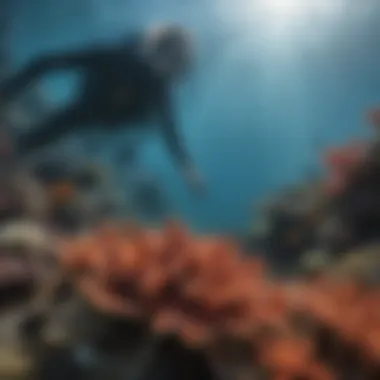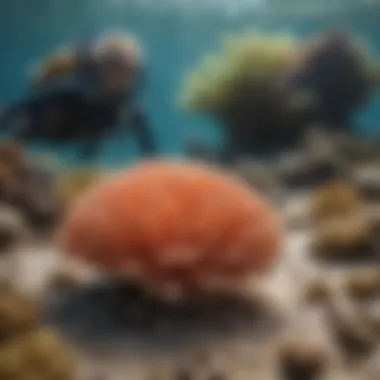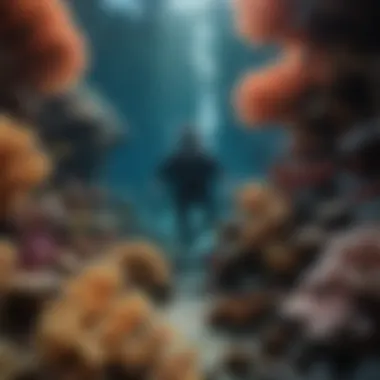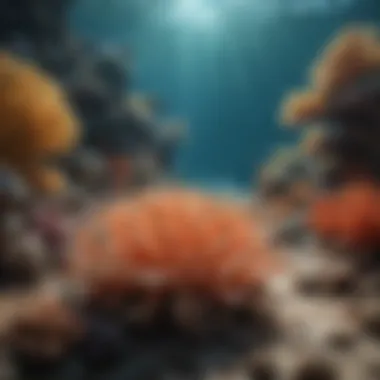Preserving Marine Ecosystems: The Coral Gardeners' Vital Mission


Coral Conservation Tools
When delving into the realm of coral gardening, equipping oneself with the appropriate tools is paramount for success. While the tools of the trade may not resemble the helmets and harnesses of extreme sports, they are crucial pieces nonetheless. Dive kits comprising coral-safe gloves, chisels, and underwater adhesive are vital for coral gardening enthusiasts. Selecting top-quality equipment from reputable brands ensures efficiency and sustainability in underwater restoration projects. Stay ahead of the curve by exploring advancements in gear maintenance, such as biodegradable adhesive alternatives, to minimize ecological impact.
Techniques Of Coral Regeneration
Coral gardeners employ a plethora of cutting-edge techniques to facilitate coral reef restoration. From fragment reattachment methods to larval propagation technologies, these pioneers in marine conservation leave no stone unturned in their efforts. Comprehensive training in coral identification and restoration techniques empowers conservationists to mimic natural coral growth patterns effectively. Drawing insights from experienced reef restoration practitioners and researchers, aspiring coral gardeners can refine their skills through hands-on workshops and simulation exercises, ensuring efficacy in preservation endeavors.
Mitigating Risks In Coral Reefs Rehabilitation
Parallel to the adrenaline-fueled world of extreme sports, coral gardening presents risks necessitating meticulous safety measures. Understanding the potential hazards of working in delicate reef ecosystems is fundamental. Implementing stringent protocols to safeguard both the environment and practitioners is crucial. Being well-versed in emergency response and risk mitigation strategies equips coral conservationists with the necessary tools to navigate unforeseen challenges. By promoting a culture of safety awareness, the coral gardening community ensures sustainable practices while protecting fragile marine habitats.
Partnership For Ocean Health
Collaboration and community engagement form the foundation of successful coral gardening initiatives. Through organized events and collaborative projects, coral gardeners forge partnerships to amplify their conservation impact. Participation in reef clean-up drives and educational workshops bolsters public awareness and support for marine preservation. Fostering a sense of community among coral enthusiasts cultivates a shared passion for ocean health, spurring collective action to safeguard precious marine ecosystems. By celebrating the interconnectedness of all life forms, coral gardeners enhance the resilience of coral reefs against the looming threats of climate change and pollution.
Foreword
Habitat loss on the southern coast has been worsened by overfishing and harmful shoreline development, pushing the vital coral reefs to the brink of collapse. The Coral Gardeners stand at the forefront of the battle, their mission clear: to revive these vibrant marine ecosystems that face imminent peril, their efforts transcending mere restoration to embody a crucial lifeline for our oceans' biodiversity.
Understanding Coral Ecosystems
Delving into the intricate world beneath the waves, we unravel the complexities of coral ecosystems that harbor an astonishing array of marine life. These fragile yet resilient structures serve as both shelter and sustenance for a myriad of organisms, showcasing a delicate balance that is under constant threat.
The Role of Coral Reefs in Marine Biodiversity


Coral reefs are the bustling metropolises of our oceans, teeming with a mesmerizing array of creatures from tiny algae to majestic sharks. Beyond their visual allure, these reefs play an indispensable role in maintaining marine biodiversity, providing a home for countless species and serving as nurseries for fish vital to coastal communities. As guardians of this underwater realm, it falls upon us to ensure their continued survival amidst mounting challenges.
Challenges Faced by Coral Reefs
Coral reefs face a multitude of challenges that jeopardize their existence, making it imperative to delve into the intricacies of these issues. Understanding the challenges faced by coral reefs is paramount in the conservation efforts led by the coral gardeners. Climate change stands out as a predominant threat, with rising sea temperatures and heightened ocean acidification endangering the delicate balance of coral ecosystems. The symbiotic relationship between coral polyps and algae is disrupted, leading to coral bleaching and eventual degradation of reef structures.
Moreover, pollution and overfishing pose severe risks to coral reefs. Excessive nutrient runoff from agricultural activities and untreated sewage discharge contribute to water pollution, impacting coral health and resilience. Overfishing disrupts the marine food chain, affecting the biodiversity of coral reefs and their capacity to withstand environmental stressors. These challenges necessitate immediate attention and strategic interventions to safeguard coral reef ecosystems.
Climate Change and Ocean Acidification
The interplay between climate change and ocean acidification poses a dire threat to coral reefs on a global scale. As the Earth's climate warms, oceans absorb excess carbon dioxide, leading to heightened acidity levels. Ocean acidification impedes coral growth and calcification processes, weakening the structural integrity of reefs. Additionally, rising sea temperatures trigger coral bleaching events, causing widespread mortality among coral populations.
Coral reefs are highly sensitive to even minor changes in environmental conditions, making them susceptible to the adverse effects of climate change and ocean acidification. The coral gardeners focus on implementing adaptation strategies and resilience-building measures to mitigate the impacts of these interconnected phenomena and foster the long-term survival of coral ecosystems.
Pollution and Overfishing
Pollution from various sources, including industrial runoff and plastic waste, inflicts substantial harm on coral reefs. Sedimentation smothers corals, while chemicals and debris disrupt their delicate ecosystem. Overfishing, driven by unsustainable practices and global demand, depletes key marine species vital for reef health and balance.
The coral gardeners are at the forefront of combating pollution and overfishing through community engagement and advocacy for marine conservation. By raising awareness about the detrimental effects of pollution and overfishing on coral reefs, these dedicated individuals strive to instigate positive changes in behavior and policy to protect these invaluable marine ecosystems.
The Emergence of Coral Gardening
In delving into the extensive topic of The Emergence of Coral Gardening within the narrative of this article, it becomes imperative to grasp the profound significance it holds. The coral gardeners' emergence represents a pivotal shift in marine conservation efforts, ushering in a new era of proactive intervention to safeguard fragile coral ecosystems. Their tireless dedication and expertise are instrumental in counteracting the detrimental effects of climate change and human activities on coral reefs globally.
The emergence of coral gardening brings forth a myriad of benefits that reverberate throughout marine ecosystems. By actively engaging in coral restoration, gardeners not only replenish coral populations but also enhance biodiversity, promote ecosystem resilience, and mitigate the cascading impact of reef degradation. Furthermore, their involvement serves as a beacon of hope, inspiring collective action and fostering a deeper connection between communities and the marine environment.
Amidst the remarkable progress achieved by coral gardening initiatives, several considerations merit attention to ensure the sustainability and effectiveness of these endeavors. It is crucial to maintain ecological balance and genetic diversity in restored coral populations, as monocultures can lead to increased vulnerability to environmental stressors. Additionally, adopting adaptive management strategies and leveraging scientific research are fundamental to continually refine restoration techniques and address emerging challenges in coral conservation.


Origins of Coral Gardening Initiatives
Tracing back the origins of coral gardening initiatives unveils a fascinating journey marked by innovation and perseverance. Initially conceived as a response to the escalating decline of coral reefs, these initiatives gained traction as a proactive approach to mitigate reef degradation and foster ecosystem recovery. The pioneering efforts of marine biologists, conservationists, and local communities laid the foundation for the widespread adoption of coral gardening practices worldwide.
Driven by a shared commitment to marine conservation, the origins of coral gardening initiatives reflect a harmonious convergence of traditional knowledge and cutting-edge science. Indigenous practices of coral cultivation intertwine with modern techniques, culminating in a holistic approach that blends cultural heritage with innovative methodologies. This fusion not only enhances the feasibility and impact of restoration projects but also cultivates a deeper appreciation for the intrinsic value of coral reefs among diverse stakeholders.
As coral gardening continues to evolve, it is essential to recognize and honor the legacy of those who pioneered these initiatives, paving the way for future generations of coral gardeners to thrive. Their visionary leadership and unwavering dedication serve as an enduring testament to the transformative power of collective action in preserving marine ecosystems for generations to come.
Techniques Employed by Coral Gardeners
In the realm of marine conservation, the Techniques Employed by Coral Gardeners stand as pivotal strategies reshaping the fate of coral reefs. These methodologies are not mere practices but intricate maneuvers embedded in environmental science's core. The value of these Techniques lies in their ability to restore damaged reef systems and bolster coral resilience amidst growing threats. Coral gardeners deploy a range of methods, each meticulously tailored to address specific challenges faced by coral ecosystems.
Coral Propagation and Transplantation
Coral Propagation and Transplantation epitomize the artistry and precision required in coral restoration efforts. This technique involves cultivating coral fragments in nurseries before delicately transplanting them onto degraded reefs. By nurturing these young corals in controlled environments, gardeners ensure their viability and increase the chances of successful integration into the reef ecosystem. The labor-intensive process demands patience, expertise, and a deep understanding of coral biology to achieve sustainable outcomes.
Artificial Reef Structures
Artificial Reef Structures serve as innovative solutions to supplement natural reef formations. These man-made creations provide additional habitats for marine life and contribute to biodiversity preservation. Through strategic placement and design, coral gardeners create artificial structures that mimic the complex topography of natural reefs, offering shelter and protection to vulnerable coral species. The use of sustainable materials and eco-friendly construction techniques further enhances the longevity and effectiveness of these artificial structures.
DNA Analysis for Coral Resilience
DNA Analysis for Coral Resilience represents a cutting-edge approach in coral conservation research. By studying the genetic makeup of coral colonies, scientists can identify resilient traits that enable certain corals to withstand environmental stressors. This scientific innovation allows coral gardeners to selectively breed more resilient coral species, ultimately enhancing the overall adaptive capacity of reef ecosystems. Integrating DNA analysis into restoration projects empowers gardeners to make informed decisions based on genetic diversity, ensuring the long-term sustainability of coral populations.
Success Stories in Coral Restoration


In the intricate realm of coral conservation, success stories in coral restoration represent beacons of hope amidst the challenges faced by marine ecosystems. These narratives of triumph showcase the tangible impact of diligent efforts and innovative approaches employed by coral gardeners worldwide. By elucidating key instances where coral communities have experienced rejuvenation and growth, this section delves into the essence of perseverance and dedication essential for preserving coral reefs for future generations.
Rejuvenating Coral Communities
Rejuvenating coral communities stands at the heart of coral restoration endeavors, embodying a profound commitment to nurturing and revitalizing damaged marine ecosystems. Through meticulous care, propagation, and strategic interventions, coral gardeners strive to create environments conducive to the flourishing of coral colonies. This subsection explores the intricate processes involved in breathing new life into coral communities, showcasing the resilience and resilience of these intricate organisms.
Rehabilitating Degraded Reef Systems
The rehabilitation of degraded reef systems emerges as a critical aspect of coral conservation efforts, underscoring the importance of mitigating human-induced damage and fostering ecological balance. In this subsection, the focus shifts towards understanding the complexities of restoring depleted reef ecosystems to a state of vibrancy and sustainability. By implementing targeted interventions and fostering natural regeneration processes, coral gardeners play a pivotal role in reversing the impacts of overexploitation and pollution on fragile reef systems.
Global Impact and Collaboration Efforts
The Coral Gardeners' crucial work extends far beyond individual efforts, emphasizing the necessity of global impact and collaboration in preserving marine ecosystems. Recognizing the interconnected nature of oceans worldwide, collaboration becomes imperative in tackling the challenges faced by coral reefs. Through collective action and shared resources, the impact of conservation initiatives reaches a broader scale, transcending borders and limitations. Global cooperation not only amplifies the effectiveness of restoration projects but also nurtures a sense of shared responsibility towards ocean conservation.
Engagement in international partnerships brings forth a multitude of benefits for coral conservation. By forging alliances with organizations and experts globally, coral gardeners gain access to diverse knowledge, resources, and innovative techniques. These collaborations foster cross-cultural learning exchanges, enriching the conservation efforts with varied perspectives and best practices from around the world. Additionally, collaborative ventures amplify the visibility and impact of coral restoration initiatives, garnering support and recognition on a global platform.
In navigating the realm of global impact and collaboration efforts, certain considerations come to the forefront. Effective communication and coordination among diverse stakeholders play a pivotal role in the success of international partnerships. Clear delineation of roles, mutual respect for differing approaches, and alignment of goals are foundational for productive collaborations. Moreover, establishing sustainable funding mechanisms and long-term commitment are vital for sustaining collaborative projects over time, ensuring continued momentum in coral conservation efforts.
International Partnerships for Coral Conservation
Within the sphere of coral conservation, international partnerships emerge as key mechanisms driving impactful change. Collaborating with international organizations, research institutions, governments, and grassroots movements, coral gardeners expand their reach and influence in safeguarding marine ecosystems. These partnerships facilitate the exchange of scientific research, technological innovations, and conservation strategies, propelling the field of coral restoration forward.
Through international partnerships, coral conservationists leverage the diverse expertise and resources of partner organizations, forming a formidable alliance against the threats facing coral reefs worldwide. Shared knowledge on coral biology, ecosystem dynamics, and restoration methodologies enhances the efficacy of conservation initiatives, leading to more sustainable outcomes. By pooling together resources and expertise, international collaborations empower coral gardeners to address complex challenges such as climate change, pollution, and overfishing with comprehensive and innovative strategies.
Moreover, international partnerships enable the global community to collectively work towards common conservation goals, transcending geo-political boundaries and fostering a sense of unity in safeguarding our oceans. By fostering relationships built on mutual trust, respect, and shared objectives, coral conservationists pave the way for a more interconnected and resilient approach to marine ecosystem preservation.
Future Prospects and Challenges Ahead
As we peer into the horizon of coral conservation efforts, the realm of future prospects and challenges unfurls before us like a vast, uncharted sea. The impetus of sustained preservation hinges upon our ability to confront emerging obstacles with fortitude and innovation. Anticipating the evolving dynamics of climate change and its repercussions on marine ecosystems is paramount. Strategies must be devised to adapt swiftly to the shifting environmental landscapes that threaten the delicate equilibrium of coral reefs markedly. Moreover, the collaborative nature of global initiatives necessitates a cohesive approach towards harmonizing diverse interests and agendas in the pursuit of a common goal. In navigating the uncharted waters of future challenges, a judicious blend of foresight, adaptability, and unwavering commitment will illuminate the path ahead, guiding us towards a sustainable future for our precious coral ecosystems.
Sustainable Practices for Long-Term Preservation
Embedded within the fabric of coral conservation lies the essence of sustainable practices, the bedrock upon which the edifice of long-term preservation stands resilient. Embracing methodologies that prioritize ecological integrity and longevity encapsulates the ethos of sustainable stewardship. Implementing measures such as ecosystem-based management, which underscores holistic approaches to resource utilization, empowers stakeholders to enact custodial roles in safeguarding coral biodiversity. Additionally, fostering community engagement and awareness catalyzes a paradigm shift towards a culture of conservation, instilling a sense of shared responsibility for the well-being of coral ecosystems. The integration of sustainable practices transcends mere preservation; it heralds a transformative journey towards a future where the legacy of vibrant coral reefs endures as a testament to our unwavering dedication to environmental stewardship.















